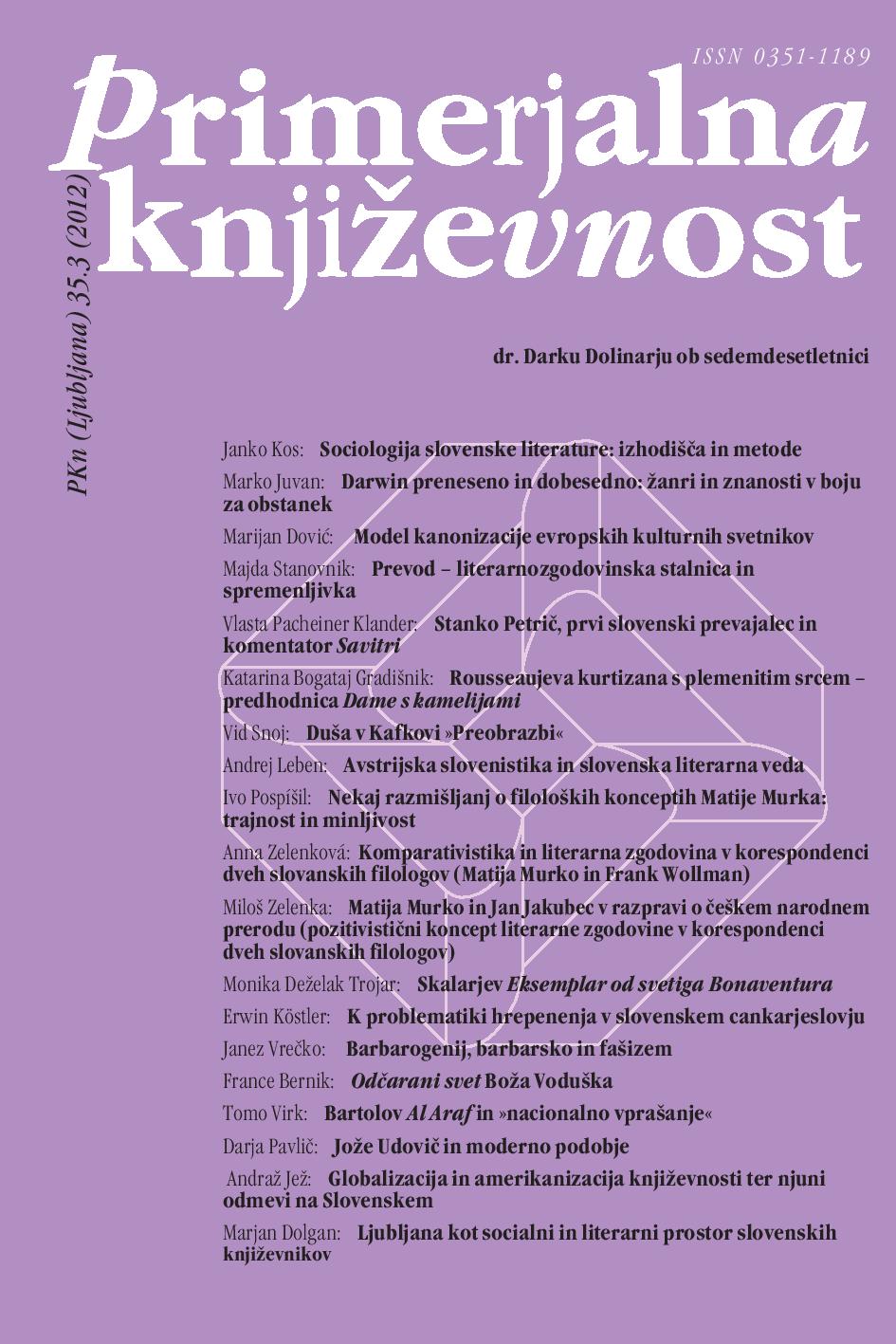Jože Udovič and Modern Imagery
Keywords:
Slovenian poetry, Udovič, Jože, literary images, metaphorAbstract
In the poetry of Jože Udovič (1912–1986), metaphors are the means through which new reality and the poem’s rhythm are created. Udovič discussed the role of metaphors in his reflections on modern poetry and his essays on the works of poets he had himself translated (Lorca, Perse, Thomas, and Celan). He emphasized the non-analogy of modern metaphors and their approximation to the absolute image, which was how he referred to Friedrich’s “absolute metaphor”; moreover—especially in the essay on Celan—he also often used the term “code”. In Slovenian literary history, the term “conceits” has become more common than these terms, referring to metaphors that connect remote words. – Hans Blumenberg, who studied the role of metaphors in the cognitive process, applied the expression “absolute metaphor” to those transfers of meaning that cannot be associated with real sense or logic. The term “absolute metaphor” raises doubts when it is interpreted as part of the substitution theory of metaphor because this theory deals with the reconstruction of real meaning or sense; however, if one is not interested in the real sense of metaphors, the term “absolute metaphor” can be adopted for denoting those images that resist interpretation and whose main effect is to surprise the reader. – According to Harold Weinrich, conceits are those metaphors that can be only weakly determined by the context. In this, the “gap” (Germ. Spanne) between the tenor and the vehicle does not play any role. Conceits in which the tenor (Germ. Bildempfänger) is not evident from the context can be equated with absolute metaphors. – An analysis of selected examples from the collection Ogledalo sanj (The Mirror of Dreams) showed that the criterion of the metaphor’s integration in the context is the most useful for evaluating the conceitedness of metaphors. In addition to absolute metaphors (which, however, Udovič did not use), metaphors that have the most conceited effect are those that poets use to create new, surprising, and previously unnoticed connections between phenomena. An example of this is Udovič’s metaphor “the stars are the crickets of the sky”.References
Black, Max. »Metafora ...« »Še o metafori«. Kaj je metafora? Prev. in ur. Božidar Kante. Ljubljana: Krtina, 1998. 91–137.
Blumenberg, Hans. »Paradigmen zu einer Metaphorologie«. Theorie der Metapher. Ur. Anselm Haverkamp. Darmstadt: Wissenschaftliche Buchgesellschaft, 1983. 285–315.
Brinkmann, Richard. »‘Abstrakte’ Lyrik im Expressionismus und die Möglichkeit symbolischer Aussage«. Der deutsche Expressionismus. Ur. Hans Steffen. Göttingen: Vandenhoeck & Ruprecht, 1970. (2. izdaja). 88–114.
Čeh, Jožica. »Pogledi na metaforo«. Jezik in slovstvo 50.3–4 (2005): 75–86.
Davidson, Donald. »Kaj pomenijo metafore«. Kaj je metafora? Prev. in ur. Božidar Kante. Ljubljana: Krtina, 1998. 191–210.
Friedrich, Hugo. Struktura moderne lirike. Prev. Darko Dolinar. Ljubljana: CZ, 1972.
Keefeld, Guntner. »Ein Zeichen, deutungslos«. Freiburger literarische psychologische Gespräche 5 (1986).
Killy, Walther. Wandlungen des lyrischen Bildes. Göttingen: Vandenhoeck & Ruprecht, 1956.
Kos, Janko. Primerjalna zgodovina slovenske literature. Ljubljana: Mladinska knjiga, 2001.
Marinetti, F. T. Teoria e invenzione futurista. Milano: Arnoldo Mondadori Editore, 1983.
Marsch, Edgar. »Die lyrische Chiffre«. Sprachkunst 1 (1970): 207–240.
Neumann, Gerhard. »Die ‘absbolute Metapher’. Ein Abgrenzungsversuch am Beispiel Stéphane Mallarmés und Paul Celans«. Poetica 3 (1970): 188–225.
Paternu, Boris. »Lirika Jožeta Udoviča«. Zbrano delo I. Jože Udovič. Ur. France Pibernik. Ljubljana: DZS, 1999. 299–320.
– – –. »Poezija Jožeta Udoviča«. Jože Udovič. Ur. Aleš Berger. Ljubljana: Nova revija, 1997. (Zbirka Interpretacije). 7–43.
– – –. »Problem nadrealizma v sodobni slovenski liriki«. Slavistična revija 20.4 (1972): 377–406.
Pausch, Holger A. »Zur Kommunikativität in modernen lyrischen Texten«. Kommunikative Metaphorik. Die Funktion des literarischen Bildes in der deutschen Literatur von ihren Anfangen bis zur Gegenwart. Ur. Holger A. Pausch. Bonn: Bouvier, 1976. 141–153.
Pibernik, France. »Opombe«. Zbrano delo I. Jože Udovič. Ur. France Pibernik. Ljubljana: DZS, 1999.
Preisendanz, Wolfgang. »Auflösung und Verdinglichung in den Gedichten Georg Trakls«. Immanente Ästhetik. Ur. Wolfgang Iser. München: Wilhelm Fink Verlag, 1966. (Poetik und Hermeneutik II). 227–261.
Richards, A. A. Filozofija retorike. Prev. Aleksandar I. Spasić. Novi Sad: Bratstvo-jedinstvo, 1988.
Udovič, Jože. »Med resničnostjo in vizijo«. Med tradicijo in modernizmom. Ur. France Pibernik. Ljubljana: Slovenska matica, 1978. 14–17.
– – –. Zbrano delo I. Ur. France Pibernik. Ljubljana: DZS, 1999.
– – –. Zbrano delo IV. Ur. France Pibernik. Maribor: Litera, 2002.
Weinrich, Harald: »Semantik der kühnen Metapher«. Theorie der Metapher. Ur. Anselm Haverkamp. Darmstadt: Wissenschaftliche Buchgesellschaft, 1983. 316–339.
Weisgerber, Jean, ur. Les avant-gardes littéraires au XXe siècle. I. Histoire. Budimpešta: Akademiai Kiado, 1984.


